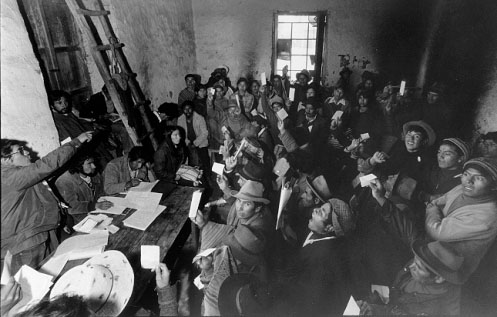
justice, peace and creation news

The struggle to bring in IPRs into the Uruguay Round of the General Agreement on Tariffs and Trade (GATT) is a classic case of transnational corporations cooperating closely with the world's most powerful nation-states to ensure that their interests will be legally protected in international and national law. In the past, the colonial governments crafted national laws which facilitated their access and control over the natural resources of their colonies. They also forged unequal bilateral treaties with their colonies or ex-colonies which allowed for free trade or which gave them parity rights to exploit natural resources or set up businesses. At present, aside from bilateral treaties, there are already multilateral agreements like the GATT (now known as WTO) whose role is to ensure that national laws will be changed to conform to the international legal regimes.
The harmonization of intellectual property rights laws to ensure that these are consistent with TRIPs could be disastrous for Indigenous Peoples. It is similar to how national laws and policies on land, forests, governance, etc. were imposed on Indigenous Peoples without any consideration whatsoever of customary laws on these same areas. In this case, however, it is an international body, the WTO, which is acting like national governments. In this case, diverse laws and policies regarding IPR protection have to be recast in the mould of TRIPS.
The form of national legislation on intellectual property rights protection is one bone of contention between the developed countries, developing countries, transnational corporations, and local communities. For Indigenous Peoples, however, the problem lies not just in the form of the law but the essence of the law itself. The TRIPS Agreement is an embodiment of western legal philosophy, norms, values, and mind set that are contrary to many Indigenous Peoples' cosmologies and values.

The concept of exclusive ownership and alienability inherent in TRIPS will have to be internalized and imbibed by Indigenous Peoples even if it goes against their usual practice of making available such knowledge for the common good. Their identity and survival as distinct peoples has depended to a large extent on this age-old practice of sharing of inalienable resources, knowledge and skills. With TRIPS, Indigenous Peoples will now have to think of how to protect their knowledge against so-called bio-pirates'. Sharing of knowledge becomes dangerous because it might be appropriated by those who have the capacity to claim exclusive ownership over such knowledge and commercialize it.
Pharmaceutical and agri-business transnational corporations are now more aggressive in their bid to gain access and control over indigenous knowledge and genetic resources that can bring them huge profits. Various bilateral agreements are forged between corporations with some national governments, some Indigenous Peoples' communities and organizations, and non-governmental organizations. In many cases, Indigenous Peoples who entered into such agreements are now finding out that they got the raw deal. This is to be expected, however, because Indigenous Peoples are pushed to play in a game in which the rules are defined by the opponents.
The remaining diverse world views, cultural and intellectual heritage, customary laws and bio-genetic resources that allow Indigenous Peoples to assert their rights to self-determination are further undermined by TRIPS. It limits their capacity to ensure that their collectively-evolved knowledge and resources will remain in their control and primarily for their use. It undermines the ethics and practice of sharing and collective ownership because what underpins TRIPS is privatization and commercialization of knowledge. The worst aspect of TRIPS is the way it forces governments to allow for the patenting of life-forms the ultimate commercialization of life.
The challenge for Indigenous Peoples, therefore, is to assert and develop further their own means of protecting their knowledge, practices and innovations so that they can continue using these for their own and others' benefit. They must be careful not to fall into the trap of assimilating imposed western norms which are not consistent with and undermine their identities as distinct Indigenous Peoples. Thus, they should play active roles in influencing the development of national laws being crafted to conform with the TRIPS requirements. They should fight against the patenting of life-forms. In the review of the TRIPS agreement, even beyond Article 27(3)(b), Indigenous Peoples should be able to formulate their positions and present these to governments and the WTO.